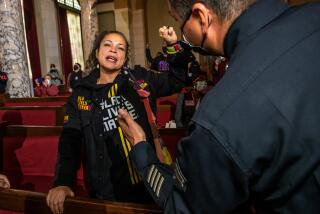Peacekeeping Tactics Outlined
- Share via
With the Inglewood police abuse trial nearing an end, a coalition of community leaders and organizations Tuesday stepped up its “peace after the verdict” campaign by detailing their strategies, which were developed over nearly a year.
“We plan to set the tone for peace,” coalition leader Khalid Shah said at a news conference outside City Hall. On the wall behind him were blue-and-white “Peace After the Verdict” signs similar to those that are in store windows throughout the city.
Leaders, who are concerned about a possible repeat of the 1992 Los Angeles riots that erupted after the Rodney G. King verdict, have been working on ways to maintain calm if residents disagree with the trial’s outcome.
Flanking Shah were young “peace ambassadors,” volunteers sporting the bright yellow T-shirts that will identify them as such on the day a verdict is announced.
Many of them have met weekly since forming the Inglewood Peace and Fairness Coalition last summer.
The coalition includes clergy, business and political leaders, community activists and representatives of the U.S. Justice Department, California attorney general’s office, Los Angeles city and county human relations commissions, the county Sheriff’s Department, and the Inglewood and Los Angeles police departments.
Shah, executive director of the nonprofit Stop the Violence, Increase the Peace Foundation, helped form the coalition shortly after the July 2002 incident in which Inglewood Police Officer Jeremy Morse, who is white, was videotaped by a bystander slamming then-16-year-old Donovan Jackson, an African American, onto the trunk of a police car.
Morse, who was fired, is charged with assault under color of authority. His partner, Bijan Darvish, is charged with filing a false police report.
On the day the verdict is announced, a prayer vigil will be held at 5 p.m. outside City Hall. About 1,500 trained volunteers will fan out on city streets, urging calm, answering questions and directing distraught people to churches and other places set up to allow for the safe venting of emotions. Church marquees will forgo the usual promotion of upcoming sermons to carry messages of nonviolence.
Similar plans are in place in other neighborhoods throughout the county. The coalition’s efforts are being touted by the U.S. Justice Department and others as a model for other communities. The Jackson case has drawn attention nationwide. After nearly 600 activists stormed Inglewood City Hall and demanded justice, Shah said, he began to fear a repeat of the deadly Los Angeles rioting and looting of a decade ago.
The 1992 violence was sparked after a jury declined to convict four LAPD officers of beating King. A videotape of that beating was shown worldwide.
Shah talked to civic, business and religious leaders, inside and outside Inglewood, and the coalition went to work, recruiting volunteers, working with youths and others, and facilitating dialogue between police officers and citizens.
Recently, young volunteers have been knocking on doors to deliver peace and unity messages in person.
“It’s OK to be angry. It’s even OK to be outraged” at an unpopular verdict, Shah said at Tuesday’s news conference.
“The steps we are taking are to ensure peace in the community, no matter what the verdict,” he said.
Mayor Roosevelt Dorn echoed Shah and said he will call on the coalition to stay together after the case ends to work on other difficult issues.
Violence, he said, “has never solved anything. As adults, we need to be role models for our young people.”
The trial’s closing arguments are scheduled for today.
More to Read
Sign up for Essential California
The most important California stories and recommendations in your inbox every morning.
You may occasionally receive promotional content from the Los Angeles Times.











